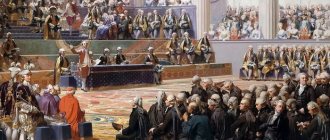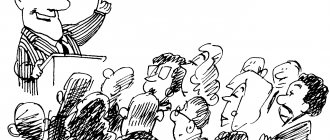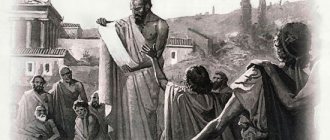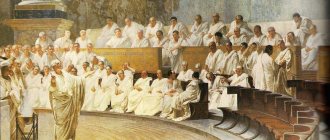Corax and Tisias
Let's start with Corax and Tisias, orators of the 5th century.
BC e. and the founding fathers of rhetoric. In the textbooks that they compiled, the so-called common places, or topoi (from the Greek τόπος - place), which we will talk about below, were collected, and also the structure according to which any speech should be built was outlined: it should have an introduction , or the so-called proemium (Greek προοίμιον), middle and conclusion, or epilogue (ἐπίλογος). The middle, in turn, was divided into two sections - narrative, or diegesis (διήγησις), and argument (ἀγών). The narration sets out events and facts; in a dispute, the opponent’s arguments are refuted and the speaker is proven right. The latter was especially important in the practice of people's courts, which resumed their work after a long break associated with tyranny. Since Greek legal proceedings did not know the institution of the legal profession and the presumption of innocence, invented later by the Romans, then, speaking in a dicastery (Greek δικαστήριον) before judges, a person, firstly, had to defend himself from the plaintiff, and secondly, Having been accused, he was already, as it were, a priori considered in some way guilty. A defensive speech (or apology), if successful, either freed him from this guilt, or, if unsuccessful, only confirmed this guilt after the fact. The purpose of judicial eloquence, therefore, was one simple thing: to convince judges of innocence if you are the defendant, or, conversely, of guilt if you are the plaintiff. A speech in defense was called an apology, an accusatory speech was called a category (Greek κατηγορία - accusation). Another important invention of this Sicilian couple was the concept of rhetorical probability, or verisimilitude (εἰκὸς). This is how eikos is defined a hundred years later, that is, approximately in the middle of the 4th century. BC e., Aristotle in his “Rhetoric ”
(1402 b20):
“Plausibility (εἰκὸς) is something that does not always happen, but for the most part.”
And here is what Plato writes about verisimilitude a couple of decades before Aristotle, who despises the art of rhetoric, and therefore Corax and Tisias, in the dialogue “Phaedrus»
(273s):
“This is the case that Tisias, apparently, cleverly came up with and skillfully described: if a weak but brave man beats a strong but cowardly man, takes away his cloak or something else, then when they are called to court, not one of them You cannot tell the truth: a coward should not admit that he was beaten by one person who happened to be with a brave man. In addition, it is necessary to prove that they met one on one, and press on the following argument: “How could I, like this, attack such a person?” The strong one will not admit his cowardice, but will try to lie something and thereby, perhaps , will give his opponent a reason to incriminate him. And in other cases there are skillful speeches of the same kind.”
Here, as always with Plato, there is not a cartload of irony, but a whole convoy, but the essence of rhetorical verisimilitude is presented absolutely accurately, especially considering that this is the oldest surviving written evidence of Tisias’ activities.
Plausibility is a problematic concept in that, being associated exclusively with rhetoric, it is opposed to truth and the search for truth as integral attributes of philosophy. That is why Plato is ironic, ridiculing Tisias and his disciple Gorgias, about whom he speaks ( Phaedrus,
267 b):
“Let Tisias and Gorgias sleep peacefully: it seemed to them that instead of truth they should respect plausibility more; by the power of their words they make small things seem big, and big things small, they make new things seem ancient, and ancient things new; for any reason they have either condensed or infinitely lengthy speeches ready.”
Pericles
The speech of the ancient Greek orator is a real performance that shows the wisdom and enlightenment of one person. However, such a spectacle becomes much more interesting if the speaker is also a political figure. Pericles was such a person. Constant communication with different people could not but affect the character and knowledge of the master of eloquence.
The flourishing of Athenian democracy is associated with the name of Pericles, so we can say without a twinge of conscience that it was this man who made an invaluable contribution to the development of the world that we know today. Thanks to Pericles and his students, Ancient Greece at one time achieved an unprecedented economic breakthrough and cultural development. It was this speaker who ordered the construction of famous buildings to begin: the Propylaea, the Parthenon, and so on.
Protagoras
Let's move on to Protagoras, who has remained throughout the centuries thanks to his maxim “Man is the measure of all things, existing, that they exist, non-existent, that they do not exist,” about which more than one generation of philosophers broke their teeth. Without going into detail about what this statement may mean - for this is more a matter of philosophy than rhetoric - let us accept the most obvious conclusion that follows from it.
Since man is the measure of everything, then there is nothing outside man, and therefore there is no Truth independent of man, which means there is no absolute knowledge, but only relative knowledge. The latter is not knowledge, but opinion, or, as the Greeks said, doxa (δόξα).
Truth is thus replaced by probability, and knowledge by opinion. Thus, in this statement, rhetorical practice - not only ancient, but also modern - found its theoretical and philosophical justification. However, Protagoras is famous not only for this. Aristotle ( Rhetoric,
1407b 7) reports that Protagoras "divided the genders of names into masculine, feminine and neuter" and therefore laid the foundations for the future of grammar as a science.
In the already mentioned Platonic dialogue “Phaedrus ”
(267c), Socrates says that Protagoras invented the “doctrine of correct speech,” or orthoepy (ὀρϑοέπεια), which is now understood as a branch of linguistics that studies the norms of literary pronunciation, in contrast to orthography - correct writing, and in the time of Protagoras, most likely, a certain use of speech was understood as befitting an educated person. Thus, Aristotle in “Poetics” (XIX, 1093) reports that Protagoras criticized Homer for the fact that at the beginning of the Iliad he addresses the goddess using the imperative mood, namely: “Wrath, goddess, sing, Achilles, son of Peleus " That is, according to Protagoras, it is worthless to command a deity. Unfortunately, Aristotle does not say whether Protagoras proposed any correction to the famous line. One way or another, it would be extremely funny to assume that Protagoras “ennobled” this line something like this: “Would you please, goddess, to sing the wrath of Achilles, son of Peleus?” Diogenes Laertius says that Protagoras “identified four types of speech - wish, question, answer and order, ... calling them the fundamentals of speech,” and also “was the first to use arguments in disputes.” From these arguments a syllogism will subsequently be born, that is, a reasoning that has two premises, a middle term and a conclusion (for example: All liquids are wet, water is liquid, therefore water is wet), and from the syllogism an enthymeme, or rhetorical syllogism, will be born , which we will talk about below in connection with Aristotle. So, as the latter liked to repeat, perhaps enough has been said about this.
Gorgias
Let us turn to Gorgias, whose name already in Antiquity was consecrated with an aura of rhetorical and sophistic holiness. Thus, Flavius Philostratus reports ( Lives of the Sophists
1:9,1), that the art of rhetoricians and sophists goes back to Gorgias “as to a father.” Nevertheless, Gorgias went down in history primarily thanks to the philosophical insight from the Treatise on Non-Being, which says:
"There is nothing. If something exists, it is unknowable. If it exists and is knowable, then it cannot be communicated to others, for we communicate not things, but words, which are different from things.”
For about two and a half thousand years, philosophers struggled with this statement and broke their teeth on it no less than on Protagoras. Some said that Gorgias was simply joking, others that he was mad, and still others that this was simply an exercise in the art of argument, or eristics, in which the Sophists were at the forefront of the ecumene. One way or another, they took all this seriously only in the 20th century, as if “rediscovering” Gorgias anew.
It turned out that Gorgias with this statement laid the theoretical foundation for his - completely performative - rhetoric: he postulated the primacy of the word (logos) over all other types of being.
But since further discussion of this will inevitably lead us into the dark depths of philosophy, it is better to focus on what Gorgias did specifically for rhetoric. In his speech “Praise to Helen” (8) he says that “The Word is a great ruler, who, having a very small and completely invisible body, performs the most wonderful things. For it can drive out fear, destroy sadness, instill joy, and awaken compassion.” But not every speech can be so omnipotent, but only that which is constructed according to strict rules using special rhetorical techniques, which Gorgias himself systematized and put into wide circulation. Here are the most significant of them: 1) tropes, that is, words used in a figurative meaning, to which Gorgias included a) metaphor and b) comparison; 2) antitheses - opposition of objects and concepts; 3) alliteration - repetition of consonant consonants (“V P
and
t e
r
p
i
t
));
4) assonances - repetition of consonant vowels (“...d and
ko, for example
and
mer, we are chickens
and
m d
and
ko, for example
and
mer...”); 5) isokolon - equality of the speech period (period is a long complex sentence with a detailed thought and complete intonation; 6) homeotelevt - rhyming of the endings of the last words in a sentence; 7) anadiplosis - repetition of the last phrase or word of the previous sentence at the beginning of the next one.
All these techniques over time began to be called Gorgian figures,” and their use created not just rhetorical prose, but prose that already bordered on poetry, thereby exerting a powerful impact on the listener. From Gorgias, in addition to the ill-fated “Treatise on Non-existence” (which was preserved only in retellings by later philosophers), three completely preserved speeches have reached us: “Praise of Helen”, which belongs to the genre of epideictic, or praiseworthy, speeches, “Defense of Palamedes” - an apology and a “Funeral homily in honor of the Athenians”—an epitaph.
A significant contribution of Gorgias is also the development of the concept of kairos (καιρός) - this is an appropriate time, opportunity or circumstance for improvised activation of speech during a speech.
In the structure of kairos, it is customary to distinguish three moments: 1) what precedes speech (the speaker’s awareness of a convenient moment for improvisation); 2) what contributes to the achievement of the oratorical goal (the positive reaction of the public when it is possible to convince it); 3) the sum of the first and second, that is, marking time using speech. In this respect, kairos goes far beyond any linguistic instrumentalism and appears as an event
, or pure speech
performance
, when speech is capable of changing the state of existence. It is kairos that allows the speaker to turn non-existence into being, the improbable into the plausible, the possible into the actual or the impossible into the possible; in other words, kairos is a means of overcoming binary oppositions or contradictions, which in themselves are completely mutually exclusive.
Thus, Gorgias anticipated many theoretical constructs of philosophers of the 20th century - from Wittgenstein and Heidegger to Lacan, Deleuze and Derrida. Perhaps this is why the philosophy of so-called postmodernism, or poststructuralism, is sometimes called the third sophistry.
Ancient rhetoric
Rhetoric is believed to have originated in the 5th century BC. e. in Sicily, when the Syracusan tyranny was overthrown and people were faced with the need to conduct many disputes and lawsuits that required the ability to persuade. Among the first, the most brilliant rhetoricians can be called Gorgias (483-367 BC), who is sometimes called the founder of rhetoric. This status attributed to Gorgias is rather dubious, since we know that Gorgias was a student of Lysias, a Syracusan orator who founded his own school, and Lysias himself was a student of Corax. According to ancient beliefs, rhetoric was given to people by Mercury on the orders of Jupiter.
The emergence of rhetoric is closely connected with Greek civilization. The term “rhetoric” itself is of Greek origin: it goes back to the word “rhetor”, the Greek name for an orator, from which the word “rhetorike” was derived - “the art of creating and delivering speech.” By the way, in Russian the word “rhetoric” used to be often written differently, closer to the Greek original - “rhetorika”.
The emergence of rhetoric is closely connected with the activities of the Sophists - ancient Greek philosophers who are known primarily for believing that anything can be proven, the main thing is to choose the right means of proof. This broad understanding of persuasion, which includes the manipulation of consciousness, the use of incorrect and/or unacceptable methods of evidence, was subsequently subjected to severe criticism. And for good reason. However, this feature of the emergence of rhetoric is very important. Apparently, it is precisely because of this that throughout almost the entire history of this discipline, rhetoric has retained the reputation of a not entirely “honest” instrument. At least, this opinion could be found among some major cultural figures in any period of European history. Although rhetoric quickly freed itself from this morally dubious burden, the peculiarities of its birth (so to speak, “birth trauma”) left an imprint on its further existence.
To better understand what this initial attitude of the early rhetoricians consisted of, let us take as an example the well-known syllogism “Horns,” which is attributed to one of the sophists (a syllogism can conventionally be called a reasoning built according to certain rules, but what these rules are, we will say in the corresponding chapter of the “Invention” section): Everything that you have not lost, you have. You haven't lost your horns. Therefore you have horns.
The fallacy of this reasoning is obvious, but it is not so easy to refute it: it is constructed in accordance with logical laws (although it violates other laws of logic). For the sake of fairness, one important point should be noted here. Perhaps there was also a need for such reasoning to be considered entirely acceptable. At the very least, it is first necessary to find out what methods of proof exist (this is what the sophists did) in order to then select from them those that are truly acceptable (this is what their critics did).
However, it cannot be said that the sophists were bad speakers and could not convince using more acceptable means. From this point of view, the following story from the life of Protagoras, one of the most prominent representatives of this movement, seems interesting. Protagoras taught one young man the art of persuasion for free; he had to pay for training only if he won his first lawsuit in court (the condition, by the way, is quite reasonable). When, at the end of his studies, Protagoras suddenly demanded payment and began to threaten with court, rightly pointing out that if he, Protagoras, won the case, the student would be obliged to pay him by court decision; if he loses, then this will be the first successful lawsuit of his student, and therefore the student will have to pay him. To this, the student objected to him that if Protagoras wins the case, then he will be able to refuse payment by virtue of the concluded agreement (after all, he will lose his first case); if he wins this case, he will be able not to pay for training by court decision. Protagoras, as reported in the sources, completely refused the payment.
Sophists are generally characterized by such an orientation towards brilliant, witty answers. Largely as a result of this, the sophists received many rather unflattering characteristics, an example of which is the following: “This name denotes the hypocritical imitation of art based on opinion, entangling another in contradictions, imitation belonging to the part of fine art that creates ghosts and, with the help of speeches, highlights in in creativity, not the divine, but the human part of magic: whoever considers the complete sophist to come from this flesh and blood, he seems to express himself quite fairly” (Plato, dialogue “Sophist”).
Nevertheless, the role of the sophists was quite important. And the whole point is that they were the first to dare to question what everyone else took on faith. From this point of view, their influence on the culture as a whole was enormous. Moreover, if it were not for the sophists, apparently, philosophers would not have discovered such a thing as truth at all. And indeed, if it were not discovered that everything without exception can be called into question, then it would not be possible to see that some things actually cannot be denied!
The ancient Greek philosopher Plato played an important role in the development of rhetoric, although his influence was not clear-cut. The model of Socratic dialogue, that is, a dialogue in which participants seek the truth with the help of skillfully posed questions, had a very great influence on the development of rhetoric. In contrast to the traditional understanding of rhetoric as the art of persuasion, Plato’s ideal, reflected in the image of Socrates from his dialogues, consisted not only of persuasion, that is, a one-sided process of influencing the listener, but also in the search for truth. Plato's statement that one cannot master the art of eloquence without knowing the truth is very important for rhetoric - and not only from a theoretical, but also from a practical point of view. At the very least, this statement allows us to identify a special perspective in developing a speech and presenting it to listeners: the mere fact that the speaker shows in his speech not a finished result, but the process of finding it, leading listeners along the path that he himself has taken, makes the speech much more convincing.
However, there were also negative aspects to Plato's concept and the way it was reflected in his work. Let's look at them in more detail.
Plato had a very negative attitude towards the sophists and sophistic rhetoric, opposing it to dialectics - a special means of searching for truth. It was Plato who questioned the moral foundations on which the rhetoric of the Sophists was based. The extremely widespread opinion today that the legacy of the Sophists should not be used is largely the result of the efforts of Plato.
The criticism of the sophists undertaken by Plato does not seem particularly justified, since it is hardly objective and completely unbiased, devoid of emotionality, which, as we know, is not always compatible with the truth. As an argument, we cite the opinion of a major philosopher of the 20th century, Bertrand Russell, who, in “The History of Western Philosophy,” in our opinion, managed to put an end to this ever-ongoing dispute between the Sophists and Plato. This excerpt is quite long, but very revealing:
“To some extent - although it is impossible to say how great the significance of this circumstance - the hatred that the Sophists aroused towards themselves, not only among the general public, but also among Plato and subsequent philosophers, owed its existence to their intellectual honesty. The pursuit of truth, when carried on sincerely, must ignore moral considerations. We cannot know in advance what the truth will turn out to be in relation to what is considered instructive in a given society. The Sophists were ready to follow evidence wherever it led them. This often led them to skepticism. One of the sophists, Gorgias, argued that nothing exists, and if anything exists, it is unknowable, and even if it exists and is knowable for one person, he cannot convey his knowledge to others. We do not know what Gorgias' arguments were, but I can well imagine that they had a logical force that forced Gorgias' opponents to take refuge in instructions. Plato always tried to pursue views that he thought would make people virtuous. It is unlikely that Plato was ever intellectually honest, because he always assessed doctrines by their social significance. But even in this he was not honest, since he pretended to follow the arguments and judge on the basis of purely theoretical criteria, while in fact he directed the dispute in such a way that it would lead to virtue as a result. Plato introduced this vice into philosophy, where it has continued to exist ever since. The character of his dialogues seems to be determined mainly by his hostility towards the Sophists. One of the shortcomings of all philosophers since Plato has been that their investigations into ethics proceeded from the assumption that they already knew the conclusions to which they had yet to arrive.”
Were the Sophists wrong in asserting that what a person believes to be true is true? This can only cause rejection when we are confronted with what appears to us as prejudice, stupidity or lack of education. But what about our own beliefs? Why do we take upon ourselves the right to claim that our point of view is correct when everyone else is wrong? This at least needs to be proven, but Plato did not do this. Our beliefs are true because they seem so to us; otherwise they would not be beliefs. And just as it is difficult to convince a “fool,” it is difficult to change your own “truths.”
This assessment deserves attention if only because Plato's dialogues are, ultimately, dramatizations of the search for truth, and not the search for truth. Plato was not a stenographer, and therefore he invents an argument, thereby presenting a fictitious image of Socrates as an ideal dialectician. The truth that Socrates supposedly comes to in the process of talking with other people was in fact known to Plato in advance. In fact, a form of conversation, an argument, is a trick, not much different from sophistry, and perhaps even more sophisticated. Of course, the misconceptions of the participants in these dialogues are quite plausible, but these are not real beliefs that can become an obstacle, but merely grounds for introducing a thought that seems correct to Plato. Conviction in the existence of ultimate truth is always a subjective conviction. Plato rejected the quite productive idea of the Sophists that there can be as many beliefs as there are people - an idea that is very important for rhetorical practice.
A special stage in the development of rhetoric is rightly associated with the name of Aristotle (384-322 BC) - an ancient Greek philosopher, logician and rhetorician. Among his works directly related to rhetoric are the treatises “Rhetoric”, “Topic” and “On Sophistical Refutations”.
Aristotle managed to rehabilitate rhetoric by eliminating the use of rhetoric associated with the manipulation of consciousness, by indicating that rhetoric should use only acceptable means of persuasion. The legacy of the Sophists (despite the rational grain they contained) needed such a radical reworking, sifting out what could not be used to prove their point of view.
Another important achievement of Aristotle is the discovery of rhetorical proofs proper. According to Aristotle, the speaker must rely on logic, but must not forget about the value and psychological side of persuasion. All this is reflected in the opposition of logos, ethos and pathos. Due to the importance of psychological arguments, it is not accidental, for example, that a significant part of Rhetoric is devoted to the analysis of different types of audience: Aristotle justifiably connects, for example, with the age of the listeners their characteristics, which the speaker must take into account when creating a speech.
The next stage in the development of ancient rhetoric is the period of Hellenism . Ancient Greece is gradually losing its dominant position, and Ancient Rome finds itself in the center of the ancient world. Although Roman culture reached enormous heights, in fairness it must be noted that without Greek influence this would not have been possible. It’s not for nothing that this period is called Hellenism: the cultural achievements of Ancient Greece were quickly adopted by Ancient Rome.
The assimilation of rhetoric by Roman culture was natural, especially since Rome in the first centuries of its existence was a republic, that is, a democratic state. Rhetoric penetrates there quite early: already in the 1st century BC. e. the rhetoric “To Gerenius” is created, which is sometimes attributed to Cicero.
One of the most prominent figures in the rhetoric of this time is, undoubtedly, Marcus Tullius Cicero (106-43 BC). In addition to a large number of speeches, which to this day can serve as excellent models for other speakers, Cicero’s theoretical works on oratory have reached us: “On the Orator”, “Brutus (On Famous Orators)”, “The Orator”, “On the Best Kind” speakers."
Cicero paid great attention to the fact that any speaker should be a versatile person: “The speaker must combine the subtlety of a dialectician, the thought of a philosopher, the language of a poet, the memory of a legal adviser, the voice of a tragedian and, finally, the grace and gestures of great actors.”
The gradual transformation of Rome into an empire in which the emperor had unlimited power had a huge impact on rhetoric. It was these circumstances that apparently led to the emergence of a new understanding of rhetoric: rhetoric began to be seen not as the art of persuasion, but as the art of speaking well. This understanding of rhetoric was most fully expressed by Marcus Fabius Quintilian (36-100 AD). Quintilian was the creator of the first state school of rhetoric; He is the author of the treatise “The Education of the Orator, or Marcus Fabius Quintilian. Twelve Books of Rhetorical Instructions."
Several important changes in attitude towards rhetoric are associated with the name of Quintillian; some of them - and perhaps all - should be considered fatal for it (although it is possible that it was thanks to Quintilian that rhetoric survived into later eras).
Firstly, as already indicated, it was Quintilian who first proposed an understanding of rhetoric as the art of speaking well. As can be seen from this definition, he no longer associated rhetoric with public communication, which requires effective persuasion. The main task of the speaker is to create an excellent expression for his thoughts, to make an art out of his activity, which only a specialist can appreciate. Now the sphere of activity of the speaker is expanding significantly and, unfortunately, is losing touch with conviction. Rhetoric goes beyond the boundaries of public life, becomes a means of pleasure and thereby becomes closer to fiction (although Aristotle, for example, very clearly separated fiction and rhetoric, to which he dedicated two different treatises - “Poetics” and “Rhetoric”).
Secondly, it is possible that it was precisely the changes in political life that provoked a change in attitude towards rhetoric that caused the flourishing in the study of figures of thought and verbal figures. In particular, Quintillian in his “Twelve Books of Rhetorical Instructions” devotes two whole parts to a very detailed classification of means of increasing the figurativeness and expressiveness of speech. This direction for the development of rhetorical theory turned out to be very tenacious: from the Middle Ages until the 19th century, as well as in the 20th century, the study of figurative speech means was perhaps the only actively developing part of rhetoric.
Finally, thirdly, it is in the rhetoric of Quintilian that one can see the first manifestation of the long process of “degeneration” of rhetoric - its transformation of an effective means of social struggle into a school discipline. Thus, Cicero believed that the speaker is truly formed in the forum, that is, in the thick of public life; Quintilian believed that the natural environment for the formation of an orator is not a forum, but a rhetorical school.
Most likely, these ideas of Quintilian were a manifestation of a deeper process - the process of transforming rhetoric into a normative discipline, the requirements of which were obligatory.
In conclusion of this sketch of the history of rhetoric in antiquity, it should be noted that rhetoric occupied a very important place in the cultural life of ancient societies. And it’s not just that it served needs related to public communication. Rhetoric was a compulsory discipline in teaching children: it, along with grammar and dialectics (logic), was part of trivia - a set of compulsory disciplines taught in schools.
Isocrates
Isocrates took up further development of such an important concept as kairos. However, if Gorgias had kairos and its use was based more on intuition and inspiration, then Isocrates reduces kairos to a completely pragmatic interpretation, turning it into an instrument of speech. In other words, kairos becomes a formal principle of speech organization, that is, the form in which the rhetorical canon (invention, disposition and elocution) is implemented, which will be discussed separately. Isocrates consciously rejects philosophical truth and replaces it with correct opinion, or doxa, because he believes that philosophical truth is not only unattainable, but also unnecessary, and even harmful. Correct opinion, according to Isocrates, is not only the goal of the speaker, but also the practical mode of action of every rational being who prefers a bird in the hand to a pie in the sky.
Demosthenes
An ancient Greek orator and part-time teacher of eloquence, who studied with Socrates and Plato for several years. Demosthenes’ speeches are also called “mirrors of character,” since the speaker was able to almost accurately recognize what was hidden in the soul of his interlocutor and choose the right words that he would like to hear. Demosthenes himself did not consider himself a rhetorician and did not like to decorate his words with invented expressions that an ordinary person could not perceive.
People loved the speaker for his fairly simple arguments and examples, which were imbued with wisdom and nobility. Also quite an interesting fact is that Demosthenes had a rather weak voice and short breathing, so there was always complete silence during his lectures so that the students could hear the teacher. By the way, perhaps you found the question in scanwords: “Ancient Greek speaker who stuttered - 8 letters?” If so, then Demosthenes was the answer.
Aristotle
So let's move on to Aristotle. His three-book work “Rhetoric” formerly consisted of two books, the third being a separate work “On Style.” And even earlier, these were simply notes of Aristotle’s lectures, which, as in the case of Metaphysics and other treatises, were systematized, edited and published by Andronicus of Rhodes in the 1st century. BC e., that is, three hundred years after the death of the great philosopher.
Rhetoric for Aristotle is a purely practical discipline, in contrast to speculative philosophy, mathematics and the physics of that time, which did not know experiments. In this respect, rhetoric is akin to ethics and politics.
And here is how Aristotle defines rhetoric based on its main purpose: “Let rhetoric, then, be the ability to discover the appropriate way of persuasion about every thing (Rhetoric, 1355b25).”
He distinguishes three types of speeches: deliberative, judicial and epideictic (indicative: praise and blasphemy). Aristotle, the greatest analyst and taxonomist of Antiquity, did not invent them, but developed and systematized them in detail. He also introduced three fundamental technical methods of persuasion, different from non-technical ones (witnesses, documents, testimony given under torture), on which the very possibility of rhetoric as discourse is based: 1) ethos (ἦθος - disposition) - that which, with the help of speech, evokes affection audience to the speaker, so that in the end the latter seems to be a good and trustworthy person; 2) logos - rational proof using a syllogism or enthymeme (it should be noted that Aristotle’s rhetoric, unlike other models of eloquence that existed at that time, is very rational, and there is every reason to assume that the philosopher learned this practical rationality after spending a short time as a student Isocrates - or maybe from his father Nicomachus, who was the court physician of the Macedonian king); 3) pathos (πάθος - passion, emotional excitement) - producing in the audience, with the help of speech, certain emotional states in which it can make the decision that the speaker needs. In connection with the latter factor, in the second book of Rhetoric, Aristotle made an attempt, unprecedented in its depth and breadth, to study and classify human emotions.
In comparison with this chapter, modern textbooks on the psychology of emotions with their eternal “frustrations,” “procrastination,” “ambivalences,” and “personal motivations” look like the babble of half-educated schoolchildren.
Also in this chapter, Aristotle examines the concept of enthymeme, or rhetorical syllogism. An enthymeme differs from a syllogism in that the purpose of the former is persuasion, and the purpose of the latter is logical proof. By enthymeme we mean a syllogism in which either one of the premises or the conclusion is omitted, but what is omitted is nevertheless implied. Remember our example with water and feel the difference. Syllogism: 1) all liquids are wet (b o
bigger parcel);
2) water - liquid (smaller parcel); therefore, 3) water is wet (conclusion). major
is missing ), or: “Water, you are wet” (both premises are missing), or: “Water, you are liquid” (the conclusion and the major premise are missing ). Thus, the enthymeme, in contrast to a strict syllogism, provides much greater scope for semantic manipulation. Aristotle also has a canonical definition of such a fundamental - not only for rhetoric, but also for language in general - phenomenon as metaphor:
“Metaphor is the transfer of a word with a changed meaning from genus to species, or from species to genus, or from species to species, or by analogy.”
We will not go into details; the reader himself can turn to the original, where Stagirite gives relevant examples in abundance; we will only add that in the modern theory of metaphor it is customary to distinguish two components: 1) the core (that which is transferred) and 2) the periphery (that which what is transferred to). Example from Brodsky: “ and a raised eyebrow
[core]
like a windshield wiper on a car
[periphery]
.
The process of transition from the core to the periphery is called signification, or signification.
In addition to Rhetoric and Poetics, Aristotle wrote a treatise called Topika, which was the first theoretical systematization of the commonplaces so important to rhetoric.
We already touched on this above when we talked about the textbooks of Corax and Tisias, which provided examples of ready-to-go topoi, but lacked their theoretical justification. Although Topika is directly related to rhetoric, it is included in the Organon, the corpus of Aristotle's logical works. This is due to the fact that the treatise discusses the basic rules of logical thinking, and in addition, “Topic” is a guide to conducting a discussion, and rhetorical speech is most often monological. Rhetorical practice gains a certain semblance of a dialogical dimension when there is an opponent who puts forward counterarguments, which, in turn, must be refuted. Thus, in the topic, rhetorical verisimilitude can meet dialectical truth, rising from rhetorical probabilities
arguments to truths that are apodeictic (evidential) and, therefore,
necessary
(if the latter exist at all).
Let's finally try to figure out what it is - topos. There is no final definition of topos, and, perhaps, there cannot be, since this is a comprehensive mental-speech phenomenon, and squeezing it into one single conceptual form is not only difficult, but, perhaps, not even necessary. We can say that topoi are certain semantic fields or models in which the very possibility of thought and, consequently, its further verbal (written, musical, pictorial, etc.) embodiment arises. We are talking about certain fundamental categories that allow us to think and speak. For example, general - particular, parts - whole, time - space, impact - suffering, good - evil, genus - species, cause - effect, single - many, example, name, authority, quote, etc. Any human statement can be associated with a whole set of topoi that are arranged in sequence, starting with complete abstraction and ending with specifics (space → place → planet → country → city → street, etc.).
Topoi are called commonplaces because they extremely generalize the content of a statement, distributing all its components into places, much like flags on a map. We can say that topica is a kind of cartography of speech, its aerial photography.
Theophrastus
Let us turn to Theophrastus (III century BC), a student of Aristotle. As we have already said, most often in Antiquity they referred to his essay “On Style,” where Theophrastus identifies four, as he says, forces (later called “virtues of style”): correctness, clarity, appropriateness, decoration. Thus, Demetrius writes that “Theophrastus considers beautiful a word that pleases our imagination and hearing or indicates a sublime thought contained in it” ( On Style,
173). He also wrote an interesting essay “Characters”, where he examined in detail the negative human qualities and continued the study of the psychology of emotions, begun by Aristotle in the second book of “Rhetoric”. “Characters” provided rich material for rhetorical argumentation—for example, to denigrate an opponent.
Theophrastus also developed a theory of speech pronunciation, thereby completing the series of “invention (invention), disposition (arrangement), elocution (creation of the text of an utterance), memoria (memorization) and accio (pronunciation).” In developing this theory, he used the experience of the acting art of the Greek theater.
Germagor
In the II century. BC e. the Greek rhetorician Hermagoras from the city of Temnos developed the theory of stasis (στάσις - point of disagreement, initial point of discussion).
Stasis refers to the main issue being discussed by the speaker and was originally used in the legal field. This is the key point, when addressed, the case turns, and the parties, although agreeing on something, enter into a period of disagreement.
If the speaker knows how to determine the moment of balance, when the forces have not yet completely collided, it is easier for him to achieve his goal. In the political sphere, for example, determining the stasis of a political issue and focusing on the relevant arguments is necessary in order to have a better chance of convincing or dissuading the relevant audience.
Demetrius, already quoted earlier (1st century AD), wrote an essay “On Style,” based on the work of the same name by Theophrastus and the third book of Aristotle’s “Rhetoric.” Most of his work is devoted to literature, but it is also important from the point of view of rhetoric, since their stylistic techniques are the same. The basis of Demetrius's stylistics is the doctrine of four styles: simple, sublime, graceful and strong.
Among the other authors, Dionysius of Halicarnassus (mid-1st century BC, “On the Connection of Words”), as well as Pseudo-Longinus (“On the Sublime”), said a new word in the theory of rhetoric. In the first work, the theory of three styles is deepened, the sound properties of language are studied, the theory of rhythms is developed, and the idea is put forward that a beautiful thought must necessarily be clothed in beautiful words, and the plan of content and the plan of expression are one. The second treatise, “On the Sublime,” explores the pathetic aspects of speech and the category of the sublime, which is “the pinnacle and height of verbal expression.”
The effect of persuasiveness is facilitated by the harmonious combination of words. Their harmony and euphony are much more important than the harmony of sounds, for in verbal harmony an infinite variety of ideas about everything that surrounds us is born.
As for the two greatest Roman rhetoricians, Cicero and Quintilian, enough has been said about them in the previous article, to which we refer the reader. Let us only add that they developed, complicated and refined what had already been invented by the Greeks long before them.
So, we have become acquainted with the basics of rhetorical theory, and now let us turn directly to the analysis of the rhetorical canon.
Themistocles
Many believe that Themistocles does not belong to the ancient Greek orators, since he was a commander and statesman, but such arguments have little weight. Even in early childhood, the aspiring speaker, according to his peers, had a tendency to participate in social activities. Even during leisure hours, he enjoyed various educational activities and improved in everything.
Therefore, his teachers constantly said that nothing mediocre would ever come out of the boy, but something great. However, the young man never relied on his natural talents and improved his skills. Over time, Themistocles became a great and renowned orator who, in addition to eloquence, also explored various fields of science, such as philosophy. Most of his works were lost as Themistocles assumed leadership positions in 493 BC.
Rhetorical canon (ideological speech cycle)
Everything that can be said within any rhetorical practice is covered by the following elements of the rhetorical canon:
Invention - invenire quid dicas (invent what needs to be said).
Disposition - inventa disponere (to arrange what has been invented).
Elocution - ornare verbis (decorate with words).
In essence, this is rhetoric as such - the three rhetorical pillars on which this entire discourse rests. Now let's talk about each of them in more detail.
Invention
As Aristotle noted, invention means the search for means of persuasion that would contain the object of speech. The invention has a three-part structure that is already familiar to us (see above): ethos, logos and pathos. Also adjacent to the invention is the use of topos (common places). Thus, the speaker’s thinking at the moment of invention operates simultaneously in three registers: the speaker thinks about his own morals (ethos) and the impression he will have on the listener, then evaluates the addressee and the emotions (pathos) that his speech and his moral character will evoke , and also reflects directly on the arguments themselves (logos), the selection of which is made through a system of commonplaces. As a result, by the end of the intervention, the speaker has a ready-made mental image in his head, a certain speech substance that needs to be streamlined. This is how the first stage ends and the transition to the next occurs.
Disposition
At this level, the arrangement and ordering of mental material, which is still in a rather chaotic state, occurs. It is to this part that the structural components of speech that we have already mentioned include: introduction, middle (presentation), conclusion. The introduction, in turn, is threefold. A simple introduction (principium) calmly introduces the listener to the topic. An indirect introduction (insinuatio) is used when the audience is hostile to the speaker and it is impossible to immediately move on to the development of the topic, so you have to beat around the bush at first. And there is also an ex abrupto (sudden) introduction, when the speech begins directly with a topic that excites the speaker. Narration, or narration, involves the presentation of facts related to a topic.
The narration should be conducted “to the point”, in connection with persons directly related to the topic of speech, accentuation of descriptions of facts is permissible in order to arouse more interest and give liveliness to the narration, but it is advisable not to let the thoughts run wild.
This is followed by confirmation (confirmation), which consists of a detailed development of the argumentation in order to prove the truth of the provisions expressed in the introduction. Here all the evidence is brought together using the so-called Homeric rule: strong arguments are deduced at the beginning, then average evidence comes, and at the end one shock argument is given, the strongest. The confirmation is followed by a conclusion, which contains a summary of the argument while appealing to the emotions of the listeners. What is desirable here is precision and stylistic richness of presentation, coupled with emotional intensity. This concludes the disposition stage.
Elocution (text formation, not to be confused with actio - pronunciation)
Speech in the human mind does not have a linear structure; rather, it is fragmented and discrete. First, at the level of invention, a selection of mental forms occurs, which are ordered at the level of disposition and, at the stage of elocution, are expressed in words. In this way, speech units are selected that are combined with already prepared and ordered mental material, after which a transition occurs directly to the speech or written levels of juxtaposition of speech objects. All this, I repeat, exists even before the speech is delivered, in the mind of the speaker. At this stage, words are selected using tropes and figures of speech, rhythm, intonation and everything that ultimately forms the style are determined.
Memoria
Everything is clear here: the prepared mental-speech material is remembered either with the use of special mnemonics or without them.
Making a speech (actio, pronunciatio)
At this stage, all extralinguistic means are used - facial expressions, gestures, etc. Also, it is at this stage that the timeliness of speech delivery is important - kairos, therefore this stage requires the speaker to exert maximum tension and composure, readiness for objections, counter-arguments and the instant launch of a new ideological speech cycle , which underlies not only a rich and pompous speech, but also the shortest and most inconspicuous remark, not only the basis of a long and passionate love letter, but also the basis of several phrases thrown in a messenger or Twitter, not only the basis of a sequence of frames of the most complex arthouse cinema, but also at the heart of our everyday selfies. This is due to the fact that the ideological speech act, or rhetorical utterance, is a universal form of expression for any sign system - music, literary texts, formal languages, painting and sculpture, computer games, etc. In a word, Jacques Lacan was right when said: “The universe is a flower of rhetoric... and I myself am just a flower of rhetoric.”








